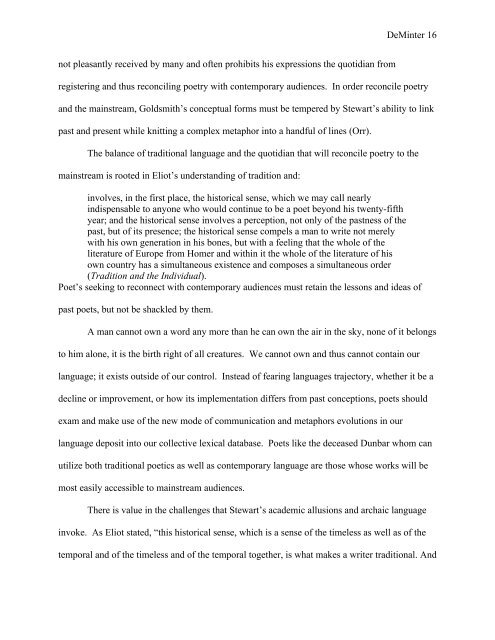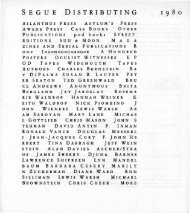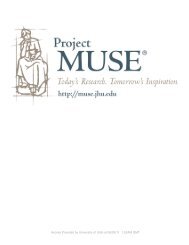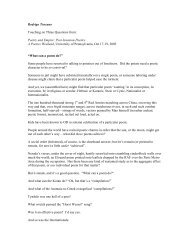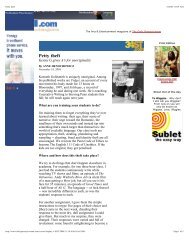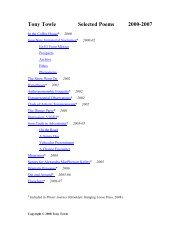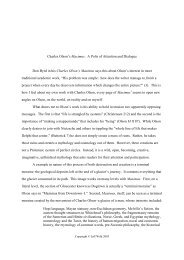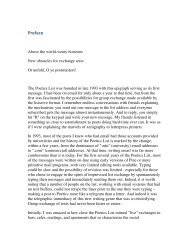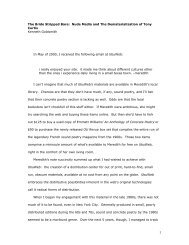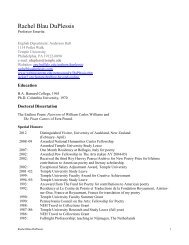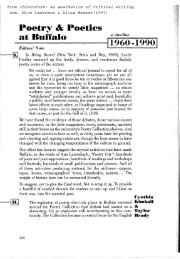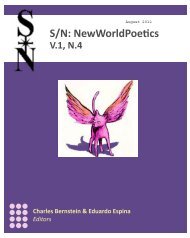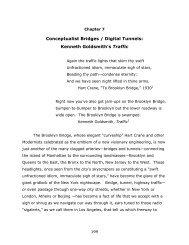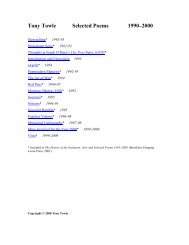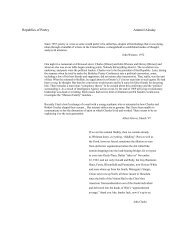P's and Q's of Poetry - Electronic Poetry Center
P's and Q's of Poetry - Electronic Poetry Center
P's and Q's of Poetry - Electronic Poetry Center
Create successful ePaper yourself
Turn your PDF publications into a flip-book with our unique Google optimized e-Paper software.
not pleasantly received by many <strong>and</strong> <strong>of</strong>ten prohibits his expressions the quotidian from<br />
DeMinter 16<br />
registering <strong>and</strong> thus reconciling poetry with contemporary audiences. In order reconcile poetry<br />
<strong>and</strong> the mainstream, Goldsmith’s conceptual forms must be tempered by Stewart’s ability to link<br />
past <strong>and</strong> present while knitting a complex metaphor into a h<strong>and</strong>ful <strong>of</strong> lines (Orr).<br />
The balance <strong>of</strong> traditional language <strong>and</strong> the quotidian that will reconcile poetry to the<br />
mainstream is rooted in Eliot’s underst<strong>and</strong>ing <strong>of</strong> tradition <strong>and</strong>:<br />
involves, in the first place, the historical sense, which we may call nearly<br />
indispensable to anyone who would continue to be a poet beyond his twenty-fifth<br />
year; <strong>and</strong> the historical sense involves a perception, not only <strong>of</strong> the pastness <strong>of</strong> the<br />
past, but <strong>of</strong> its presence; the historical sense compels a man to write not merely<br />
with his own generation in his bones, but with a feeling that the whole <strong>of</strong> the<br />
literature <strong>of</strong> Europe from Homer <strong>and</strong> within it the whole <strong>of</strong> the literature <strong>of</strong> his<br />
own country has a simultaneous existence <strong>and</strong> composes a simultaneous order<br />
(Tradition <strong>and</strong> the Individual).<br />
Poet’s seeking to reconnect with contemporary audiences must retain the lessons <strong>and</strong> ideas <strong>of</strong><br />
past poets, but not be shackled by them.<br />
A man cannot own a word any more than he can own the air in the sky, none <strong>of</strong> it belongs<br />
to him alone, it is the birth right <strong>of</strong> all creatures. We cannot own <strong>and</strong> thus cannot contain our<br />
language; it exists outside <strong>of</strong> our control. Instead <strong>of</strong> fearing languages trajectory, whether it be a<br />
decline or improvement, or how its implementation differs from past conceptions, poets should<br />
exam <strong>and</strong> make use <strong>of</strong> the new mode <strong>of</strong> communication <strong>and</strong> metaphors evolutions in our<br />
language deposit into our collective lexical database. Poets like the deceased Dunbar whom can<br />
utilize both traditional poetics as well as contemporary language are those whose works will be<br />
most easily accessible to mainstream audiences.<br />
There is value in the challenges that Stewart’s academic allusions <strong>and</strong> archaic language<br />
invoke. As Eliot stated, “this historical sense, which is a sense <strong>of</strong> the timeless as well as <strong>of</strong> the<br />
temporal <strong>and</strong> <strong>of</strong> the timeless <strong>and</strong> <strong>of</strong> the temporal together, is what makes a writer traditional. And


